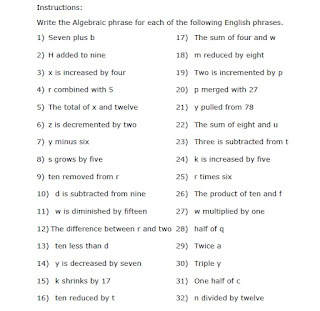Creating High Expectations in My Class
I have found the following things effective in creating high expectations in my classrooms:
1) Establishing that I am there to help them become adults in their thinking through the instruction of logical thought via Mathematics.
2) Teaching a problem solving process that is visible to the students and applicable to real-world problems.
3) Reflective journal writing about the strategies students use to prepare for and do summative assessments.
4) Constant reminding about how Mathematics is a fair subject (moments of genius are always followed by moments of stupidity)
5) Student work written work must be clear enough so that anyone in the world can understand what the problem is and what the student's approach was, and how the solution was obtained.
These factors combine to create an ecosystem that makes high expectations a natural consequence of our work in class.
I present adult life as something quite complex and that dealing with life's unexpected problems is not something you naturally know how to do. The complexity poses a challenge for everyone in the room and an important part of success is knowing how to reduce the unexpected into smaller more manageable pieces that are prioritized correctly. Mathematics provides good training for some of those skills. This line of discussion sets their minds towards the goal of becoming an adult before I ever talk about Math problems.
I teach a process that requires students to preview, set up, mentally work through, then attempt a solution. Then the student tests it is correct and either adjusts his/her assumptions with new approaches/info, or makes the written work organized and presentable. This process is used in many fields and is recognized by almost all students as being applicable outside the realm of Math. So there is a subtle hidden expectation of being a successful adult. Teaching a process also shifts focus from the student to the student's application of the process. Mistakes aren't personalized. The student is no longer bad at Math, but bad at setting up a problem, or bad at writing it formally. So I can pose hard problems in the guise of seeing what parts of their process needs development, and they will try it with little resistance.
Reflection on the Strategy of Preparation and the Strategy of Execution comes from the work of Deanna Kuhn. The idea being that awareness of these two aspects of higher order thinking are present in people fluent in knowledge of a subject. (Kuhn, 2000) Making students aware that most of their mistakes are due to poor strategies rather than poor subject knowledge, goes a long way to empowering students to do better. Most people are not bad at Math, they are bad at preparing for Mathematical work, or bad at doing it. The knowledge is there. When students realize they have poor processes for these tasks, it becomes quite easy for them to work on reading directions more carefully, or taking notes in class to help improve their studying. The high expectation is created by lowering the barriers to being a high achieving person...
I constantly remind students that mathematics requires attention to detail and focus. There will many moments where those requirements run against human nature, so one should expect to make monumental mistakes just as much as one expects moments of great insight. Just because the written work is rigidly logical and seamless doesn't mean the thinking to get there is logical and seamless. Foggy thinking is fine and brilliant thinking is fine. Poorly expressed thinking is not. Students find this line of reasoning reassuring and it fosters an attitude of shrugging off the mistakes and trying again. Shrugging off the mistakes means students will be more tolerant of trying the hard problems, making it easier for me to expect them to be done.
Requiring clarity in work is presented as a vital skill for working in today's world. Students are likely to be working with people from other cultures, or people with different skill sets. Having a reputation for creating work that is effortlessly easy to understand and use is vital for being seen as a leader, or a valuable team member. Again, there is the expectation that the students will be high achieving adults.
I hope these points show how I create an ecosystem that makes high expectations natural and doable for the student.
Bibliography for this and the previous post:
Project Based Inquiry Science in Action at Franklin
Schools PBIS. (2014, September 27).
Retrieved November 21, 2017, from It's About Time.edu Channel on YouTube:
https://www.youtube.com/watch?v=rfHr4GRkTRY&feature=youtu.be
Roller Coaster Physics: STEM in Action . (2017). Retrieved November 23, 2017, from Teaching
Channel: Getting Better Together:
https://www.teachingchannel.org/videos/teaching-stem-strategies
Biffle, C. (2009, June 28). Whole Brain Teaching:
High School Math. Retrieved November 24, 2017, from Chris Biffle Channel
on YouTube:
https://www.youtube.com/watch?v=h6WJdsb0dfM&index=3&list=PLDFbMqKBFbk8x9KfLOipq2t1iSHkrd_Rx
Biffle, C. (2011, June 21). Whole Brain Teaching:
High School Math. Retrieved November 24, 2017, from Chris Biffle Channel
on YouTube:
https://www.youtube.com/watch?v=26xQHAASMSU&index=1&list=PLDFbMqKBFbk8x9KfLOipq2t1iSHkrd_Rx
Cajon Valley Union School District. (2014, September
19). Project Based Learning in the Blended Learning Classroom. Retrieved
November 21, 2017, from YouTube:
https://www.youtube.com/watch?v=9ydndLS-O3Q&feature=youtu.be
Grinder, M. (2016, June 6). High Expectations
(2016). Retrieved November 23, 2017, from YouTubeHK:
https://www.youtube.com/watch?v=EwvLji95rB8
Kuhn, D. (2000). Metacognitive Development. Current
Directions in Psychological Science, 9(5), 178-181.
University of Auckland. (2016, June 12). What if
all Teachers Had High Expectations for All Students? Retrieved November
23, 2017, from YouTubeHK: https://www.youtube.com/watch?v=Ib9DUTL34Pc


Comments
Post a Comment